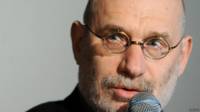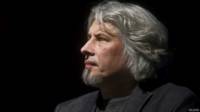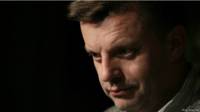- April 11, 2015
Post

Boris Akunin, Vladimir Sorokin, Boris Grebenshikov, Leonid Parfenov, Sergei Parkhomenko – these are just some of the names of the participants in the opening of the Russian literary London Festival SLOVO.
Festival has been held for the sixth time, but this year the situation, the atmosphere, the context – it looks quite different. Over the past year, Russia has changed dramatically, its perception of itself and the world. Changed the perception of Russia in the world. As far as all this is changing the festival, its content, financial and organizational conditions of the meeting? With this issue we began a conversation with the founder and permanent director of the festival, head of the London-based Academia Rossica Svetlana Adjoubei.
Svetlana Adjoubei: Changes radical. All previous years the festival was supported by the Russian state. Even if support was not focused – we did on the remains of the funds that the state allocated to us for the organization of the Russian stand at the London Book Fair – but still it was a help from the state.
Of course, the context has changed. Of course, Russia is now more focused on their internal politics, alienation between Russia and the West is constantly growing. Such a situation for us again it is amazing, we are accustomed to the fact that Russia – a large part of the world. That is why our festival is even more necessary today than ever before.
It is ironic, however, that at this time the Russian state ceases to finance this kind of cultural and humanitarian projects related to the promotion of the image of Russia. On a minor note ended with a cross-year culture of Russian-UK, a number of major projects were canceled: us, Academia Rossica, for the first time in many years, it was not possible to carry out a traditional Russian Film Festival in London, not a holiday “Russian Winter” and “Mardi Gras”, on indefinitely postponed a grand exhibition “astronauts” at the Science Museum.

For the first time in eight years at the opening next week of the London Book Fair will not stand Russia. We do this stand began eight years ago, “Rospechat” very actively involved in its development, in 2011, Russia was the guest of honor at the fair, came 50 writers and more than 100 publishers. It was really loud and meaningful project that really helped modern Russian literature positioned in the global cultural space. It is very sad that now all these efforts collapsed and almost come to naught.
lost, disappeared the political will of the state to promote cultural and humanitarian image of Russia abroad. Russia began to speak a completely different language.
Alexander Kahn: And now, according to a press release of the festival, he performed exclusively at private expense – you helped the largest network in the UK Waterstones bookshops and its owner, Russian businessman Alexander Mamut.
Svetlana Adjoubei: Yes, we can say that the festival is held thanks to our enthusiasm and little financial support from Alexander Mamut. This support did not start now, six years festival is held in SLOVO flagship store network – Waterstones Piccadilly in central London. But this year, when we were completely deprived of state support, Alexander Leonidovich framed his shoulder, supported us, and we are very grateful to him.

This has changed, and the general direction of the project. Losing state component, we shifted to Russian London. Our main goal – to influence the image of Russian, Russia’s image in London. We live here, we are interested in it. People who live in Russia, much less feel the change of attitude towards the country. And we feel it every day.
And the type of festival SLOVO projects designed to show that the Russians – conscious society that is aware of its own interests, is aware of its responsibility to the country, our native country Russia, is perceived abroad in particular here in London. And so it is important that it has become a festival of all Russian London. In London now Russian extraordinary concentration of talented, bright, intelligent people, people who sadly are looking at the fact that Russia does not develop, she turns her back to the world and to its past, instead of looking to the future.
We all sigh and say that all this is happening because in Russia there is no civil society. What prevents us from here to create a civil society, in our little Russian London? I would very much like to see our festival has become such a platform on which this community has been able to become aware of themselves.
That is why our festival is not only about literature. His subtext – civil society. Therefore, we tied him up with the theme of charity. This topic is very important. Important for Russian literature, which has always been famous as one of the most humane, humane literature in the world, this is its uniqueness and value. And right now these qualities Russian literature extremely relevant.
Throughout the world, now a shortage of humanity, mercy, compassion, empathy – all of what we learn from each of its line of great Russian literature. We need to remember this, go back to their culture, their literature. This is what can be the basis for restoring the unity of society, split, torn by internal conflicts. And this applies not only to Russia – the same thing is happening in the Arab world, in Europe, everywhere.
Alexander Kahn: In these conditions, fragmentation, fragmentation, excessive politicization of the world in general and Russia in particular whether there is a political component in the festival? Are you trying to make it political content, to carry out a particular political line?
lost, disappeared the political will of the state to promote cultural and humanitarian image of Russia abroad. Russia began to speak a completely different language.
Svetlana Adjoubei: If she sounds, it is secondary. As always, as in all of our projects, the main thing – the ethical value. After all, what is culture and art? It is a way of communication, a way of communication. Culture should not be people separation means, conversely, that the dialogue means, a conversation between humans. In the context of an excited politicized rhetoric is very important to go back to the most basic, fundamental concepts of humanity.
Alexander Kahn: This reorientation in Russian London, you are talking about, does it that the festival had left his attempts as much as possible to cover the British public? In previous years, I remember meeting with readers around London, even forays beyond it – in Oxford, Edinburgh, and other cities. This time, all concentrated in Waterstones Piccadilly. This task is not placed due to the lack of financial or organizational capacity has changed the concept of?
Svetlana Adjoubei : No, this task is always a very important task. It has changed a bit, simply because we are swimming against the current, against the negative context, which is accompanied by almost any message from Russia. It is very difficult. But the difficulty lies in the fact that the Russian people living outside the country and, in particular, here in London, and I heard all this negative rhetoric inevitably face the temptation to withdraw from Russia.
Like in Russia, Russian, living abroad, are fragmented. In dealing with a British audience, in an attempt to explain to them what is happening with Russia, not least becomes a conversation not only about literature, but also about the Russian society as a whole. Therefore, along with the writers in our festival attended by prominent journalists and Sergei Parkhomenko, Leonid Parfenov. Ourselves, Russian, it is necessary to do some inner work with ourselves and with our society.

And more. It is very important that people in Russia, having heard about this festival, did not think that it’s some toy wealthy Russian Londoners. No, it’s a festival, permeated concern about Russia, eager to participate in her life to help her overcome this detachment from the world, fear of the future. This, in general, a lot of talk about the Russian and British participation in it very important. Brits should see that this conversation is in Russian. That we are all looking for ways and exits, we are all trying to come up with a good scenario for Russia.
No comments:
Post a Comment